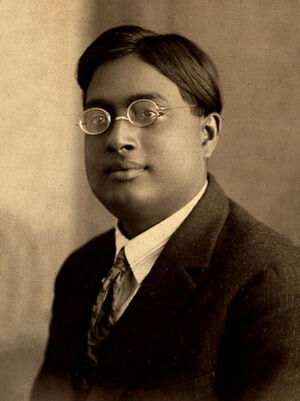Satyendra Nath Bose (nonfiction)
Satyendra Nath Bose (Bengali: সত্যেন্দ্রনাথ বসু Sôtyondronath Bosu), FRS (1 January 1894 – 4 February 1974) was an Indian physicist from Bengal specialising in theoretical physics.
He is best known for his work on quantum mechanics in the early 1920s, providing the foundation for Bose–Einstein statistics and the theory of the Bose–Einstein condensate.
A Fellow of the Royal Society, he was awarded India's second highest civilian award, the Padma Vibhushan in 1954 by the Government of India.
The class of particles that obey Bose–Einstein statistics, bosons, was named after Bose by Paul Dirac.
A self-taught scholar and a polymath, he had a wide range of interests in varied fields including physics, mathematics, chemistry, biology, mineralogy, philosophy, arts, literature, and music. He served on many research and development committees in sovereign India.
In the News
Fiction cross-reference
Nonfiction cross-reference
External links:
- Satyendra Nath Bose @ Wikipedia
